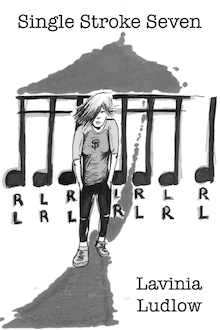Our Research Notes series invites authors to describe their process for a recent book, with “research” defined as broadly as they like. This week, Lavinia Ludlow writes about Single Stroke Seven from Casperian Books.
+
 Back in the ’90s, I’d find excuses to invite myself over to a friend’s cable-accessible house to watch VH1’s Behind the Music, that kitschy documentary show about musicians’ rise to the top, the drama beyond the stage wings, and their downward spiral into arrest, rehab, breakup, or death. I was hooked on the ominous theme music and the host’s dramatic voice detailing smorgasbords of sex and drugs, and overnight fame and fortune.
Back in the ’90s, I’d find excuses to invite myself over to a friend’s cable-accessible house to watch VH1’s Behind the Music, that kitschy documentary show about musicians’ rise to the top, the drama beyond the stage wings, and their downward spiral into arrest, rehab, breakup, or death. I was hooked on the ominous theme music and the host’s dramatic voice detailing smorgasbords of sex and drugs, and overnight fame and fortune.
Since those afternoons in front of borrowed TV time, I’ve ached to hear a different story, one more relatable, one that broached the show’s concept from the opposite end of the journey. Instead of highlighting the rise (and fall) of rock stars, why not investigate the fall of aspiring musicians and the smorgasbords of sacrifices and suffering they endure simply to make ends meet?
Single Stroke Seven was fashioned out of a collection of my own experiences and those of my friends and local community. I strategically selected challenges and miseries to support the book’s leading theme:
Yeah, suffer for your art but what happens when it’s killing you?
Most of the novel was written out of a desperate attempt to soothe myself after working 10-12 hour swing shifts in a factory, where I not only felt I was being eaten alive by employees and management, but the bolts holding together my personal life were a few pressure points away from fracturing. The long hours straddled by a brutal commute often bled into the graveyard hours of the night, leaving me little quality of life, much less time or energy to put toward music. Instead of self-medicating at the bottom of a bottle of Jameson, I worked out my frustration by writing about musicians undergoing similar challenges: living (behind) paycheck-to-paycheck and failing to get ahead in life.
I presented the imagery of a lifestyle that a casual reader would commend for being artistic and Bohemian, but also pity. Here was a band of college grads from the “Peter Pan Generation” working as janitors and fry cooks, scarfing Ramen and condiments, drinking coffee made with reused grinds, and taking urgent medical care into their own hands. I drew on first and second-hand experiences to illustrate the desperate measures taken to pay the rent, many of which would never pass as white collar or even blue collar, but something DIY just substantial enough to hide our shame. We’ve staved off hunger by eating meals of condiments or Dickey’s BBQ Pit’s free all-you-can-eat pickles and soft serve. We’ve slept in the train stations, under desks, and twenty-four-hour diners to avoid the cost and time associated with brutal commutes. We’ve worked dead-end jobs because if you were fortunate to have one during the economic crisis, no matter how miserable, humiliating, or dangerous, you clung to it like “the last life vest on the Titanic.” Like millions, we’ve found ourselves on the losing end of accessible health care, and when it came to COBRA, a quote from the text:
…whichever C-Span star designed that healthcare program obviously knew nothing about the burdens of being laid off in the Silicon Valley.
At times, we were too deep in survival mode to remember what we were fighting for in the first place.
To answer the question that most readers would ask: why would anyone voluntarily pursue such an agonizing lifestyle, and for so long? I drew on my point of view as a member of a generation that won’t be better off than its predecessor, is statistically estimated to die younger, and is more adrift in existential white noise than ever. During extended periods of economic uncertainty, I often find myself stagnant and unchanging, even in the face of daily misery. It is within my nature, and many others I know, to cling to what’s consistent and certain: the battles fought in the war for survival and the organic camaraderie borne in the trenches. Sometimes the quest and the people we commiserate with along the way are worth the suffering, and even if they aren’t, they’re all we have.
When I look back on my experiences: the dead-end jobs, pickle dinners, and all the humiliations in between, it was worth it. This book was worth it.
+++